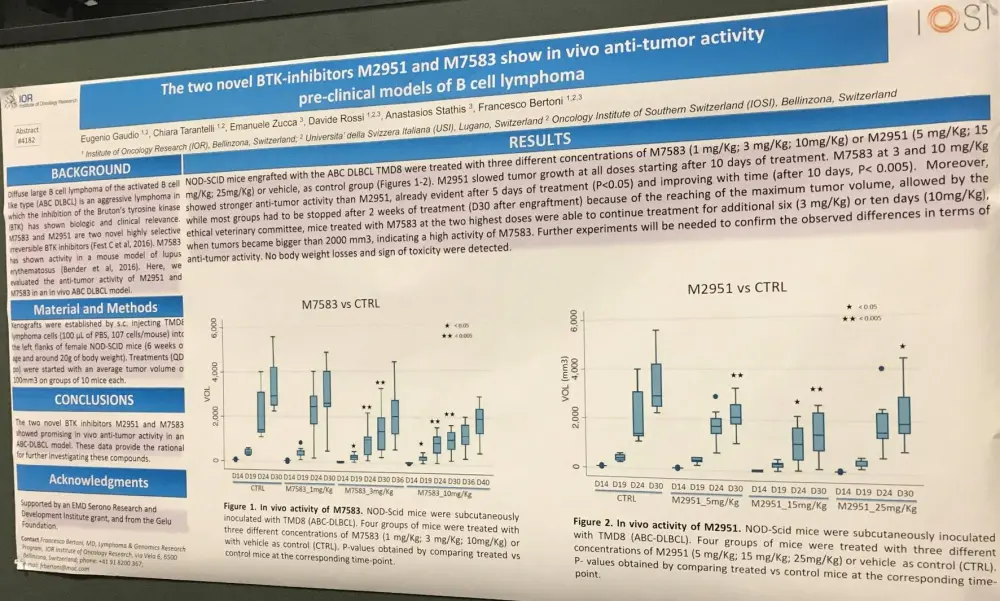All content on this site is intended for healthcare professionals only. By acknowledging this message and accessing the information on this website you are confirming that you are a Healthcare Professional. If you are a patient or carer, please visit the Lymphoma Coalition.
The lym Hub website uses a third-party service provided by Google that dynamically translates web content. Translations are machine generated, so may not be an exact or complete translation, and the lym Hub cannot guarantee the accuracy of translated content. The lym and its employees will not be liable for any direct, indirect, or consequential damages (even if foreseeable) resulting from use of the Google Translate feature. For further support with Google Translate, visit Google Translate Help.
The Lymphoma & CLL Hub is an independent medical education platform, sponsored by AbbVie, BeOne Medicines, Johnson & Johnson, Miltenyi Biomedicine, Nurix Therapeutics, Roche, Sobi, and Thermo Fisher Scientific and supported through educational grants from Bristol Myers Squibb, Lilly, and Pfizer. Funders are allowed no direct influence on our content. The levels of sponsorship listed are reflective of the amount of funding given. View funders.
Now you can support HCPs in making informed decisions for their patients
Your contribution helps us continuously deliver expertly curated content to HCPs worldwide. You will also have the opportunity to make a content suggestion for consideration and receive updates on the impact contributions are making to our content.
Find out more
Create an account and access these new features:
Bookmark content to read later
Select your specific areas of interest
View lymphoma & CLL content recommended for you
AACR 2017 | Poster 4182/5 – The two novel BTK-inhibitors M2951 and M7583 show in vivo anti-tumor activity in pre-clinical models of ABC type Diffuse Large B-Cell Lymphoma
At the American Association for Cancer Research (AACR) annual meeting in Washington, DC, USA, on Tuesday 4th April, a poster session titled “Targeting Protein Kinases and DNA Repair” took place.
One of the posters on display (4182 / 5) was titled “The two novel BTK-inhibitors M2951 and M7583 show in vivo anti-tumor activity in pre-clinical models of B cell lymphoma” by Eugenio Gaudio from the Institute of Oncology Research, Bellinzona, Switzerland, and colleagues.
This group aimed to evaluated the anti-tumor activity of M2951 and M7583 (two novel, highly selective, irreversible BTK inhibitors) in an in vivo ABC DLBCL model. Xenografts were established by SC injection of TMD8 cells (100µL of PBS, 107 cells/mouse) into the left flanks of female NOD-SCID mice. Treatments (QD, po) began with an average tumor volume of 100mm3 on groups of 10 mice each.
Key Highlights:
- Mice were treated with three different concentrations of M7583 (1, 3, or 10mg/Kg) or M2951 (5, 15, or 25mg/Kg) or vehicle (control group)
- M2951 slowed tumor growth at all doses starting after 10 days of treatment
- M7583 at 3 and 10mg/Kg showed stronger anti-tumor activity than M2951, apparent after 5 days of treatment (P < 0.05) and improving with time (after 10 days, P < 0.005)
- Most groups had to be stopped after 2 weeks of treatment (D30 after engraftment) due to reaching maximum tumor volume; however, mice treated with M7583 at the two highest doses were able to continue treatment for additional six (3mg/Kg) or ten days (10mg/Kg) when tumors became bigger than 2,000mm3, indicating a high activity of M7583
- No body weight losses or signs of toxicity were observed
The poster concluded that M2951 and M7583 displayed encouraging anti-tumor activity in vivo in their ABC DLBCL murine model. The data supports further investigation of these compounds for the treatment of B-cell Lymphomas.

References
Please indicate your level of agreement with the following statements:
The content was clear and easy to understand
The content addressed the learning objectives
The content was relevant to my practice
I will change my clinical practice as a result of this content

